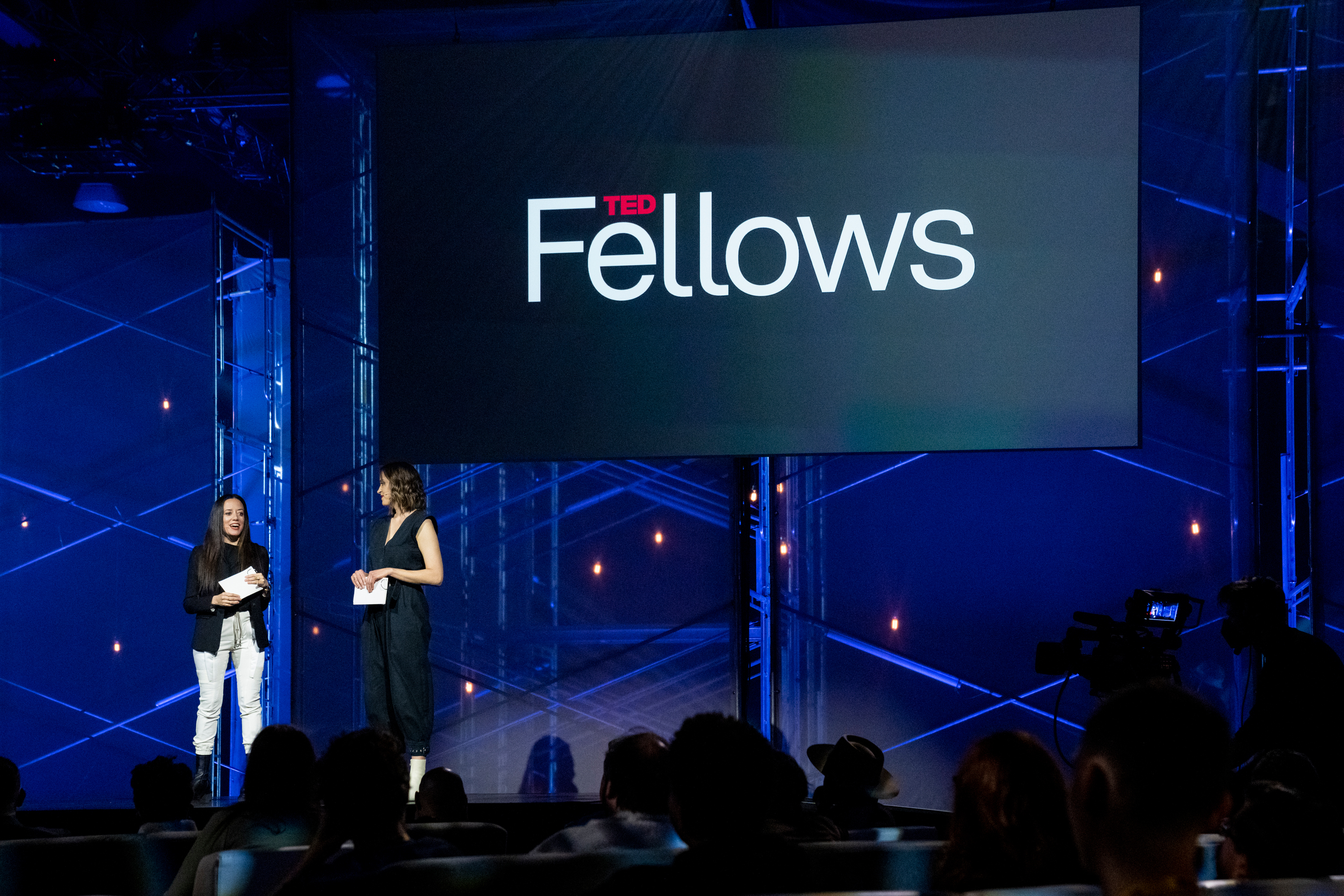
TED Fellows director Shoham Arad and TED Fellows deputy director Lily James Olds host Session 1 of TED Fellows Talks at TED2022: A New Era on April 10, 2022, in Vancouver, BC, Canada. (Photo: Ryan Lash / TED)
The TED Fellows program is built around a deep belief in and commitment to socially engaged innovation and human ingenuity. The mission: to shift the balance of power by supporting whole individuals, both personally and professionally. At Session 1 of TED Fellows talks at TED2022, 11 speakers and two performers shared world-changing ideas and innovations from the fields of astrophysics, conservation, social change, art and so much more.
The event: Talks from Session 1 of TED Fellows Talks at TED2022, hosted by TED’s Shoham Arad and Lily James Olds
When and where: Sunday, April 10, 2022, at the Vancouver Convention Centre in Vancouver, BC, Canada
Speakers: Jessie Christiansen, Adetayo Bamiduro, Gautam Shah, Micaela Mantegna, Ryan Gersava, Enzo Romero, Bree Jones, Lam Ho, Kyra Gaunt, Bektour Iskender, Constance Hockaday
Music: Visual artist and composer Paul Rucker put his strikingly masterful cello technique on display with a haunting yet meditative rendition. And musician “Blinky” Bill Selanga thrilled the audience with his Afrocentric beats and dynamic energy, performing “Kilamu” and “Ama Aje”.
The talk in brief:
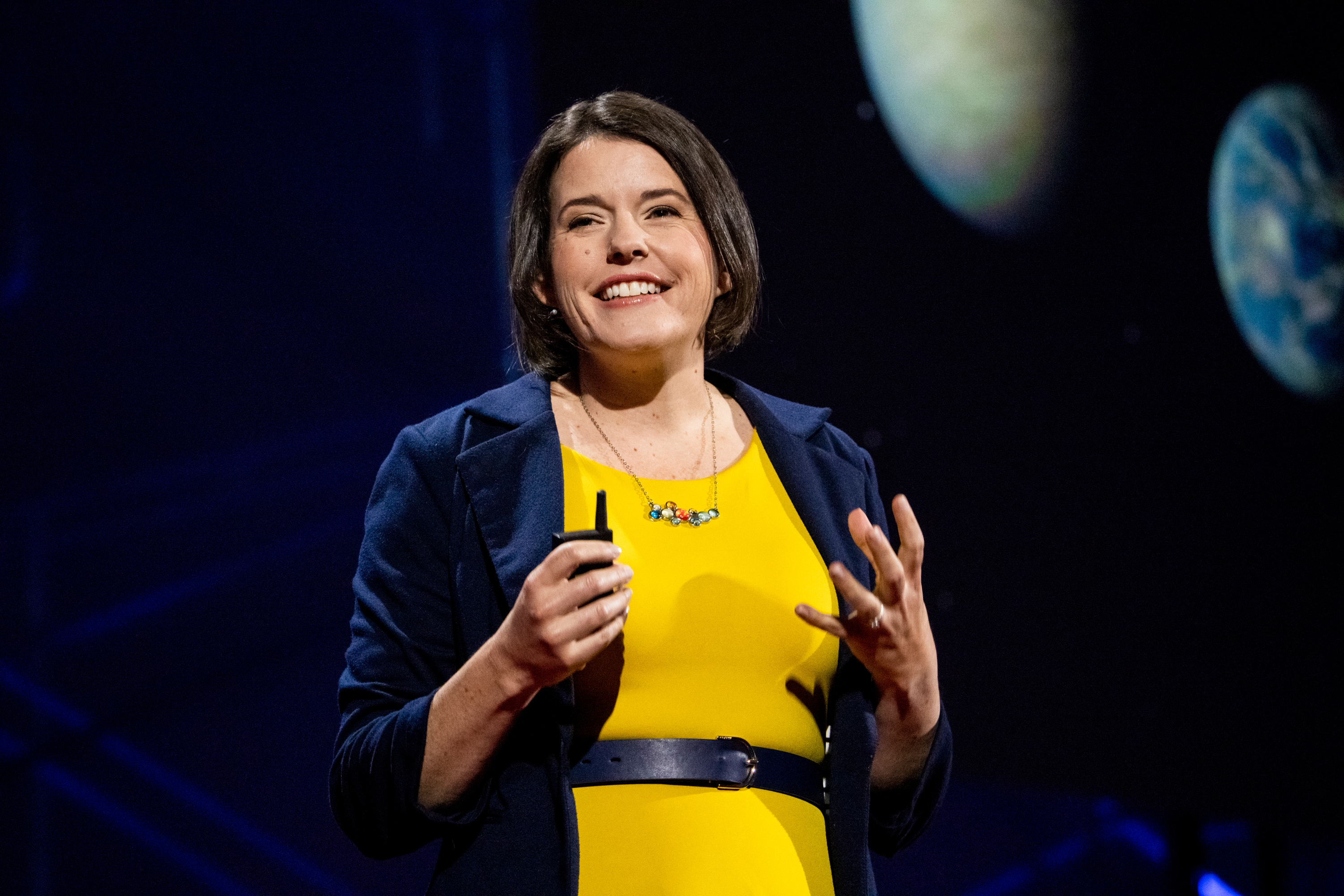
Jessie Christiansen speaks at Session 1 of TED Fellows Talks at TED2022: A New Era on April 10, 2022, in Vancouver, BC, Canada. (Photo: Ryan Lash / TED)
Jessie Christiansen, planet hunter
Big Idea: The discovery of 5,000 exoplanets (and counting) is more than impressive; their data could answer timeless questions about our very existence.
How? When Jessie Christiansen joined NASA’s Kepler mission in 2010, she’d already spent four years combing through 87,000 stars, searching for an exoplanet. On her second day of the mission, she’d found her first and second. As of March 2022, 5,000 exoplanets have been found, and the new data means we can finally ask bigger questions: Can planets exist without a star? Can they orbit each other? How many are like Earth? How are planets made? And perhaps most famously: Where do we come from, and how did we get here? “There’s a saying that this generation was born too late to explore the Earth and too soon to explore space. That’s not true anymore,” Christiansen says.
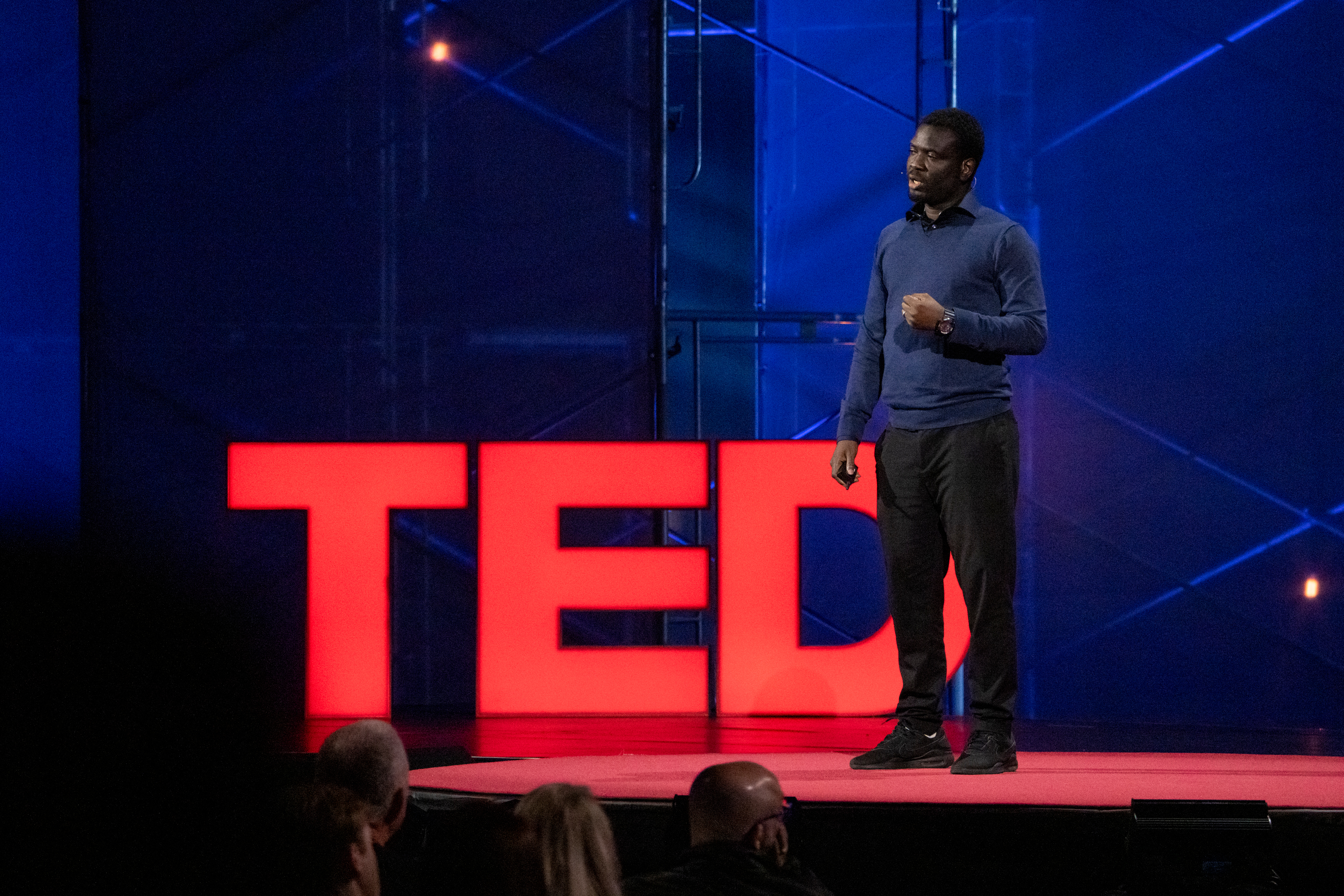
Adetayo Bamiduro speaks at Session 1 of TED Fellows Talks at TED2022: A New Era on April 10, 2022, in Vancouver, BC, Canada. (Photo: Ryan Lash / TED)
Adetayo Bamiduro, motorcycle financing entrepreneur
Big idea: Africa is being left behind in the transition to clean mobility. Motorcycles are the secret to a cleaner, more profitable future for the continent.
How? By 2050, Lagos, Nigeria will outgrow many cities in the world including New York City and Mexico City, becoming home to more than 32 million people. Currently, Lagos and other African mega-cities like it suffer from inadequate road infrastructure, pollution, congestion and poor conditions. One of the many impacted by these issues is the African motorcycle taxi driver, who is excluded from the formal economy, left to the mercy of polluting vehicles and high costs due to exploitative loans sharks. At MIT, Bamiduro met his business partner, and together they embarked on a fix: an integrated approach to the design, manufacturing and financing operations targeted at highly vulnerable informal groups. Broken down into three parts, their solution provides motorcycle taxi drivers with access to electric vehicles and batteries, maintenance and insurance and emergency assistance, helping more than 15,000 drivers renew their livelihoods. By 2025, their goal is to provide electric mobility solutions to 150,000 drivers, paving the way towards a more sustainable and prosperous future for the world’s youngest and fastest-growing continent.
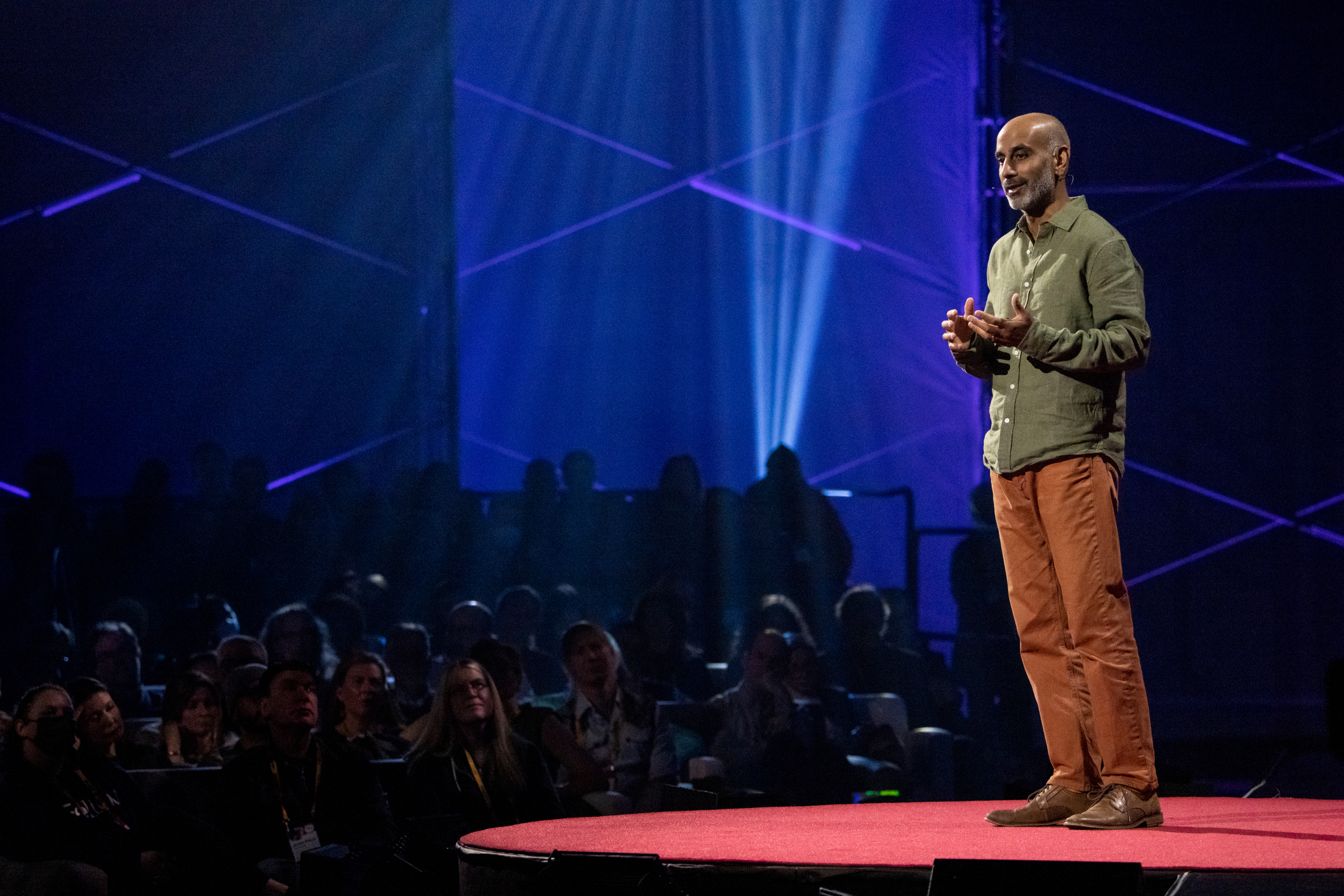
Gautam Shah speaks at Session 1 of TED Fellows Talks at TED2022: A New Era on April 10, 2022, in Vancouver, BC, Canada. (Photo: Ryan Lash / TED)
Gautam Shah, conservationist
Big idea: Wildlife conservation efforts could be more successful if we create and strengthen our relationships with other species. Advanced technologies like the metaverse could play an essential role.
How? “If we want to preserve all life on Earth, we need to create relationships with all life on Earth,” says Gautam Shah, whose combined passion for wildlife and technology makes him acutely aware of the disconnect between humans and other species. Technology has helped us collect lots of data about our fellow non-human inhabitants of Earth, but Shah observes that this data hasn’t been fully contextualized for the millions of people around the world who express interest in wildlife. His solution? A unique digital identity for animals that allows them to exist in virtual spaces like the metaverse, bringing their stories closer to us. By digitally recreating the events that happen in nature — from elephant migration to deforestation — Shah believes that humans could use the metaverse to feel less detached from and more engaged with their natural environment.
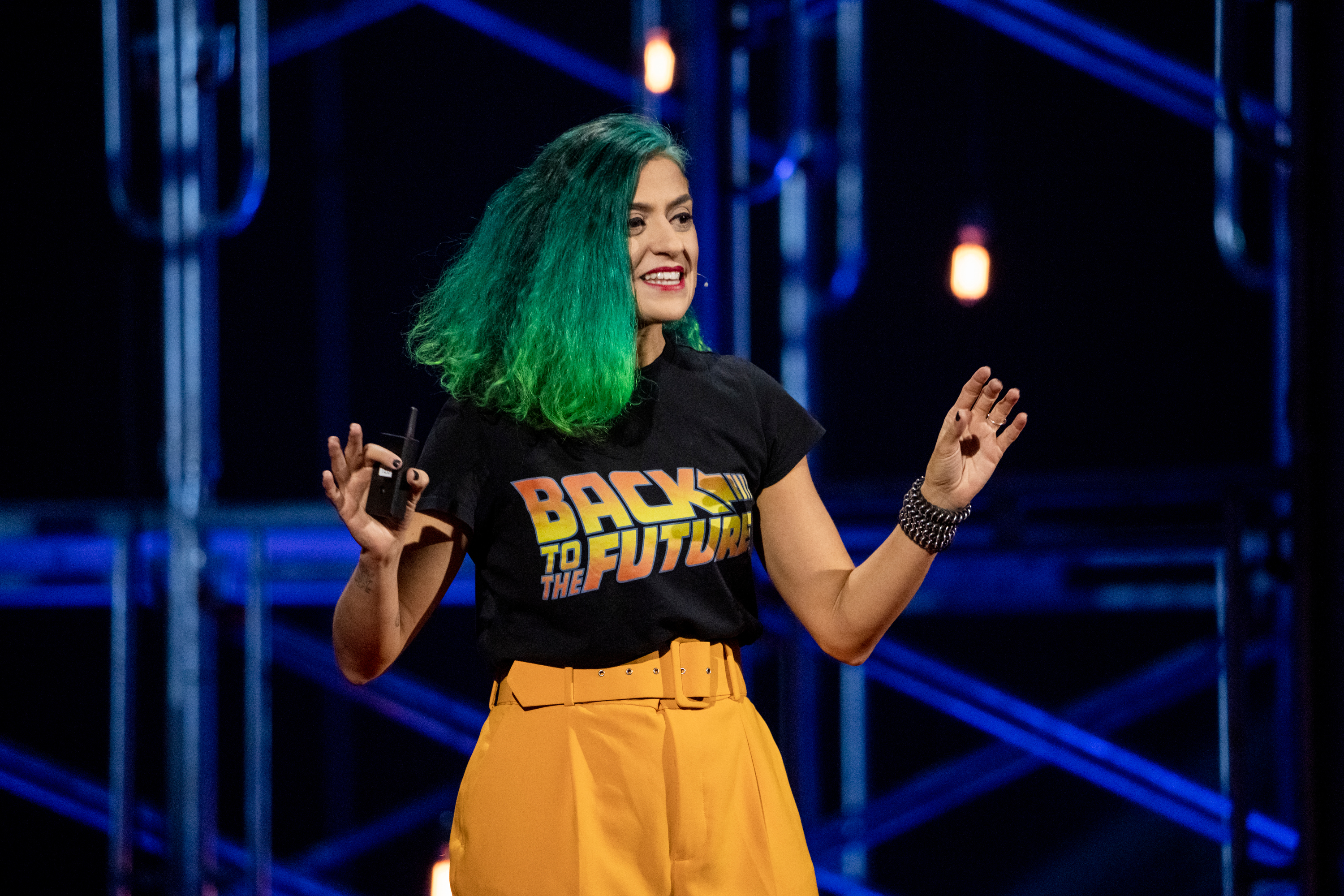
Micaela Mantegna speaks at Session 1 of TED Fellows Talks at TED2022: A New Era on April 10, 2022, in Vancouver, BC, Canada. (Photo: Ryan Lash / TED)
Micaela Mantegna, video game lawyer
Big idea: How do we save the metaverse from becoming a bad internet sequel? Basic human qualities of kindness and connection.
How? “The metaverse is here and is already on fire,” says Micaela Mantegna. At a cross-section between augentmented and physical reality, the metaverse has the frightening potential of inheriting the worst traits of the internet, with VR and neurotechnology using involuntary data to create, as Mantagna puts it, “a capitalism of cognitive surveillance.” To save us from this fate, a coordination of engineering and law, based on kindness and connection, must be implemented to ensure content portability across different software environments and identical legal standards throughout. “It’s not every day that humanity has the chance to create new a reality, so, my invitation to you: let’s make it a good one,” she says.
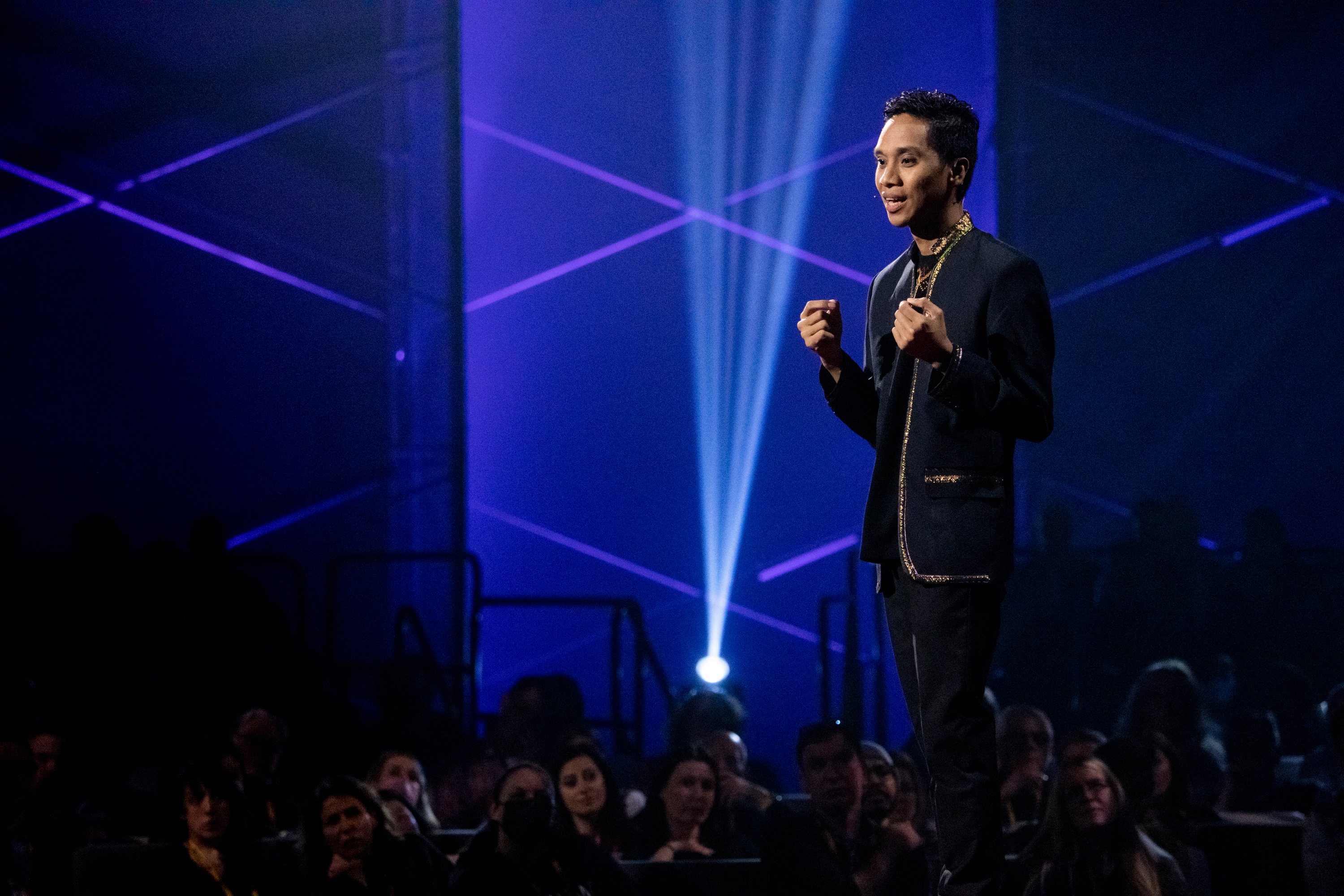
Ryan Gersava speaks at Session 1 of TED Fellows Talks at TED2022: A New Era on April 10, 2022, in Vancouver, BC, Canada. (Photo: Ryan Lash / TED)
Ryan Gersava, social innovator, educator
Big idea: Building a world where all people — including those with disabilities and chronic illnesses — can find belonging starts with healing.
How? Social innovator, educator Ryan Gersava is one of the nearly billion people worldwide living with a disability, which often leads to chronic illness and decreased chances of employment, lack of social protection and extreme poverty. His healing journey led him to start an online vocational school in the Philippines, Virtualahan, which provides training to people with disabilities, recovering addicts and others who struggle to find employment. So far they’ve graduated hundreds of people in more than 60 cities and provinces all over the Philippines, setting them up to earn an average of 40-60 percent above minimum wage. Now he’s calling on organizations to invest in talent with disabilities, and for all of us to investigate our biases around disability and chronic illness, which makes it difficult and painful for people to disclose their conditions. “There’s no need to suffer in silence anymore,” Gersava says. “I invite you to be part of this movement.”
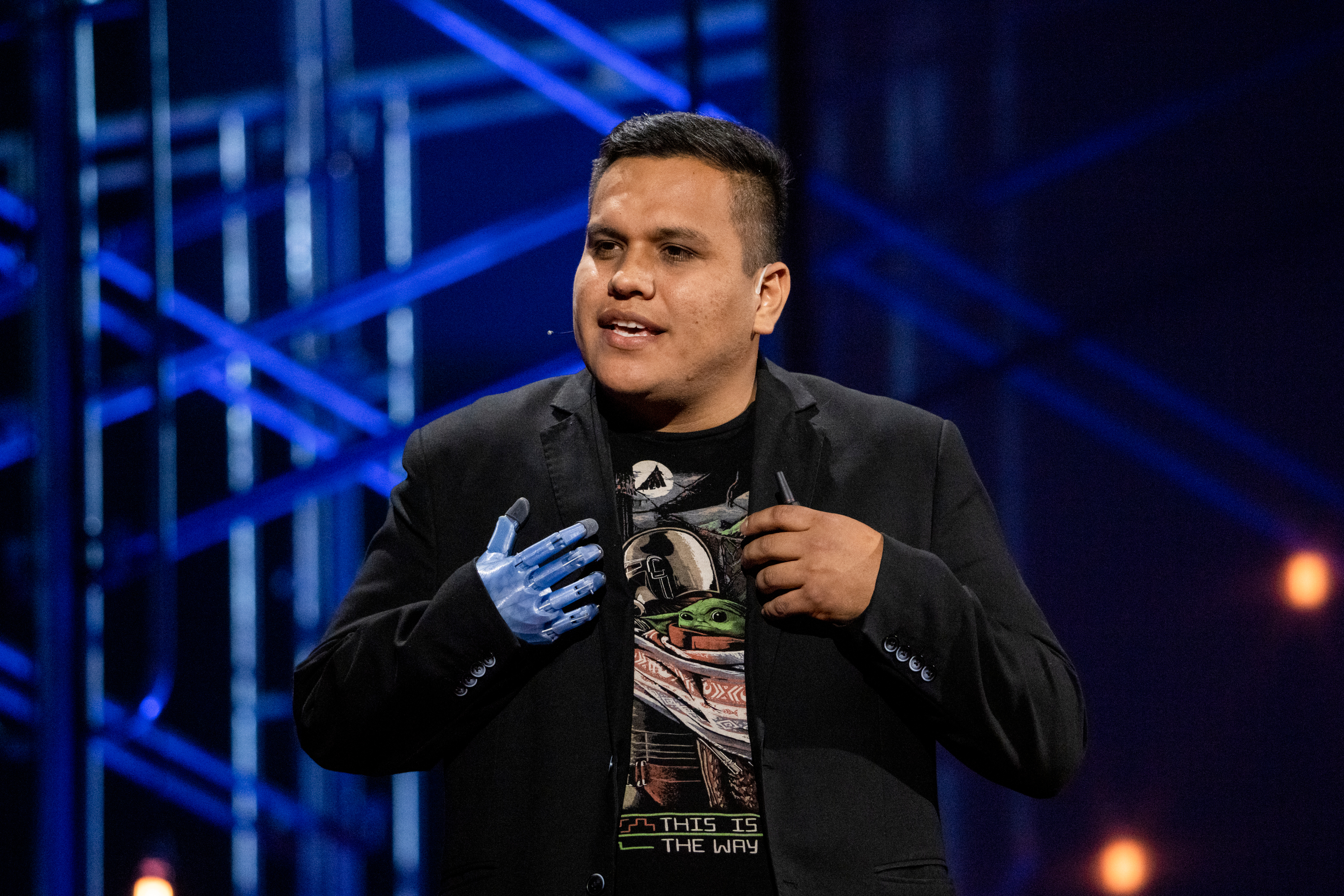
Enzo Romero speaks at Session 1 of TED Fellows Talks at TED2022: A New Era on April 10, 2022, in Vancouver, BC, Canada. (Photo: Ryan Lash / TED)
Enzo Romero, bionic innovator
Big idea: Prosthesis for developing nations should be designed locally, with the needs of the communities they are built for in mind.
Why? As a child born without his right hand, Enzo Romero was astonished and inspired by the prosthetics he would see his favorite movie characters (like Luke Skywalker) wearing. But in his home country of Peru, they are far too expensive for the majority of amputees. With the intent of creating functional and affordable options, Romero and his team at LAT Bionics isolated the most used occupational gestures: pinch, cylindrical and lateral, and designed mechanical and myoelectric prostheses around them. Their devices, such as the Maki, which runs on mechanical activation, and the Pisko, which runs on electronic activation, cost a fraction of what imported tech does. Why? The parts are 3D printed with materials mainly sourced from recycled plastic bottles. “We have the capacity to develop our own technology, having the necessities of our people in mind, so then people with disabilities and limited resources can live life again,” Romero says.
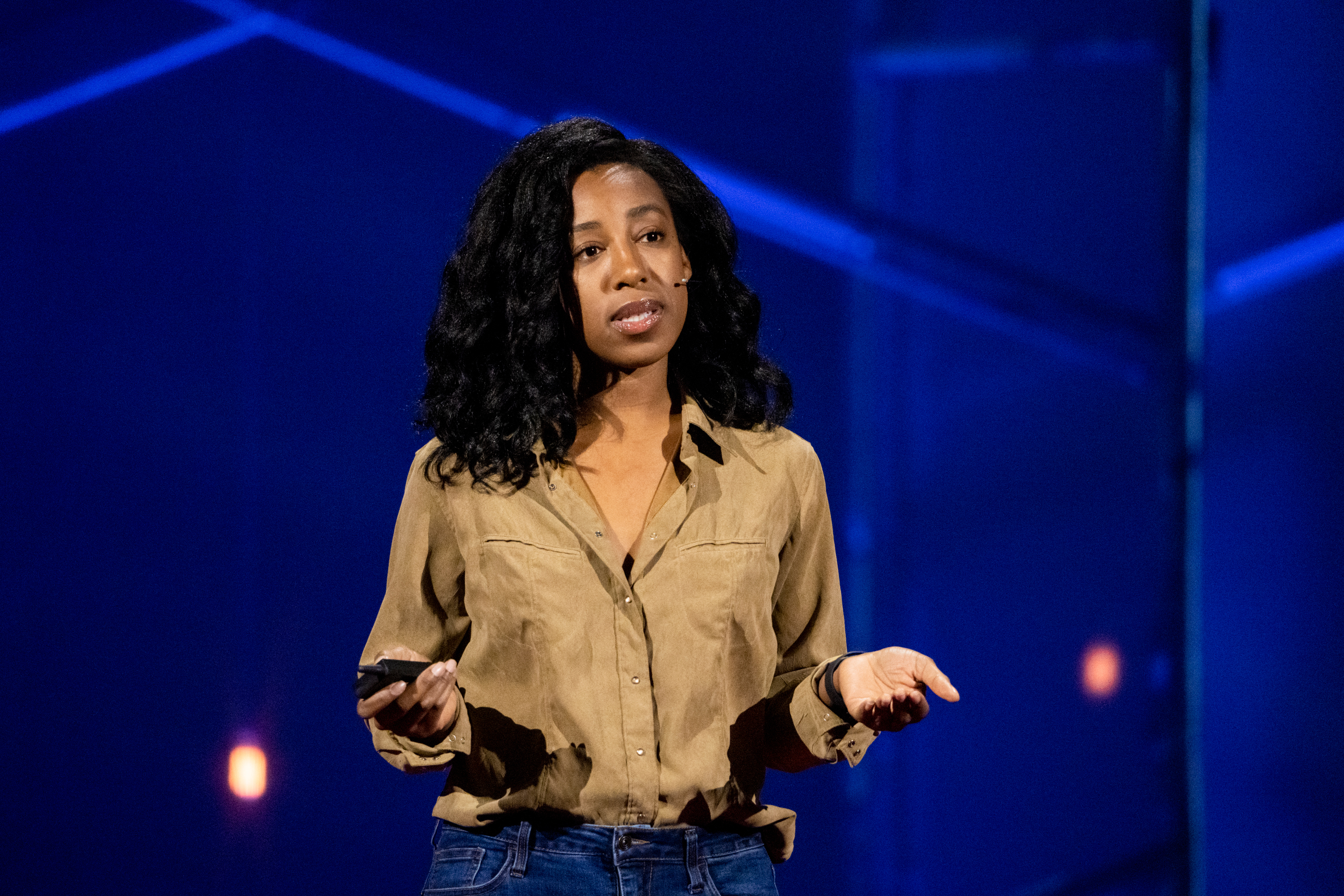
Bree Jones speaks at Session 1 of TED Fellows Talks at TED2022: A New Era on April 10, 2022, in Vancouver, BC, Canada. (Photo: Ryan Lash / TED)
Bree Jones, equitable housing developer
Big idea: Development and homeownership opportunities in overlooked neighborhoods are possible — without the displacement of existing residents.
How? Systemic barriers like redlining have (and continue to) keep Black communities from building wealth through real estate and other assets. Housing advocate Bree Jones explains how developing neighborhoods often are subjected to two trajectories: people move away and the area is deemed a risky investment, so either the quality of life there decays or the neighborhood is gentrified and new residents capitalize off of the distress of legacy residents by scooping up undervalued real estate and selling it back at a higher price. To end these toxic cycles of the racial wealth gap, Jones founded Parity, a nonprofit that creates upfront demand for homeownership in neighborhoods experiencing hyper vacancy by tapping into existing social networks. They’re doing this by leading the purchase and construction of vacant homes and selling them at affordable prices; helping people attain creditworthiness; and preventing displacement, allowing current residents to accrue wealth they can pass on to the next generation. “We’re healing the social fabric of the neighborhood as we’re rebuilding the built environment,” Jones says.
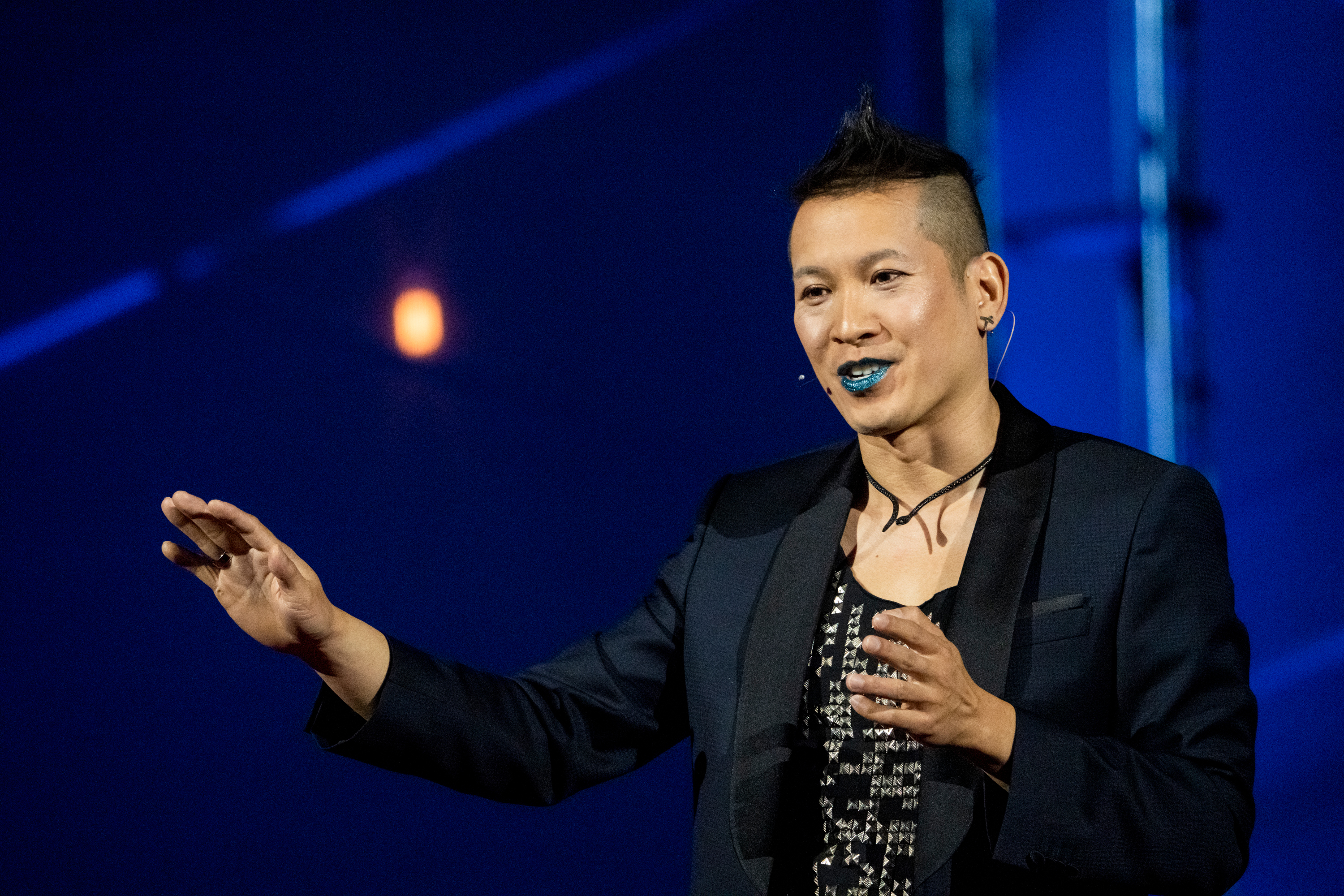
Lam Ho speaks at Session 1 of TED Fellows Talks at TED2022: A New Era on April 10, 2022, in Vancouver, BC, Canada. (Photo: Ryan Lash / TED)
Lam Ho, legal aid activist
Big idea: The way the American legal system works needs to change. Clients deserve to have agency over their own cases in court – and lawyers should support them with their knowledge of the law.
How? As a lawyer, Lam Ho witnessed the same thing happen in courtrooms across the US: clients aren’t given the chance to contribute their perspective during their own legal proceedings. Ho’s mother didn’t have a say in her divorce because she didn’t have an attorney and Ho thought by becoming a lawyer he could help people like her but instead, Ho realized he became a part of the problem. Instead of forcing families with limited resources to accommodate lawyers and their voices being silenced, Ho wants the dynamic of the US legal system to flip. He founded Beyond Legal Aid so lawyers can change the system from within by allowing clients to be participants in the process – rather than be subjected to it. By inviting clients to tell their own stories in court, their own way, justice can be created – even when the law is wrong. “We can give advice and empower them to navigate the law, but ultimately follow their lead and defer to their decisions.” says Ho.
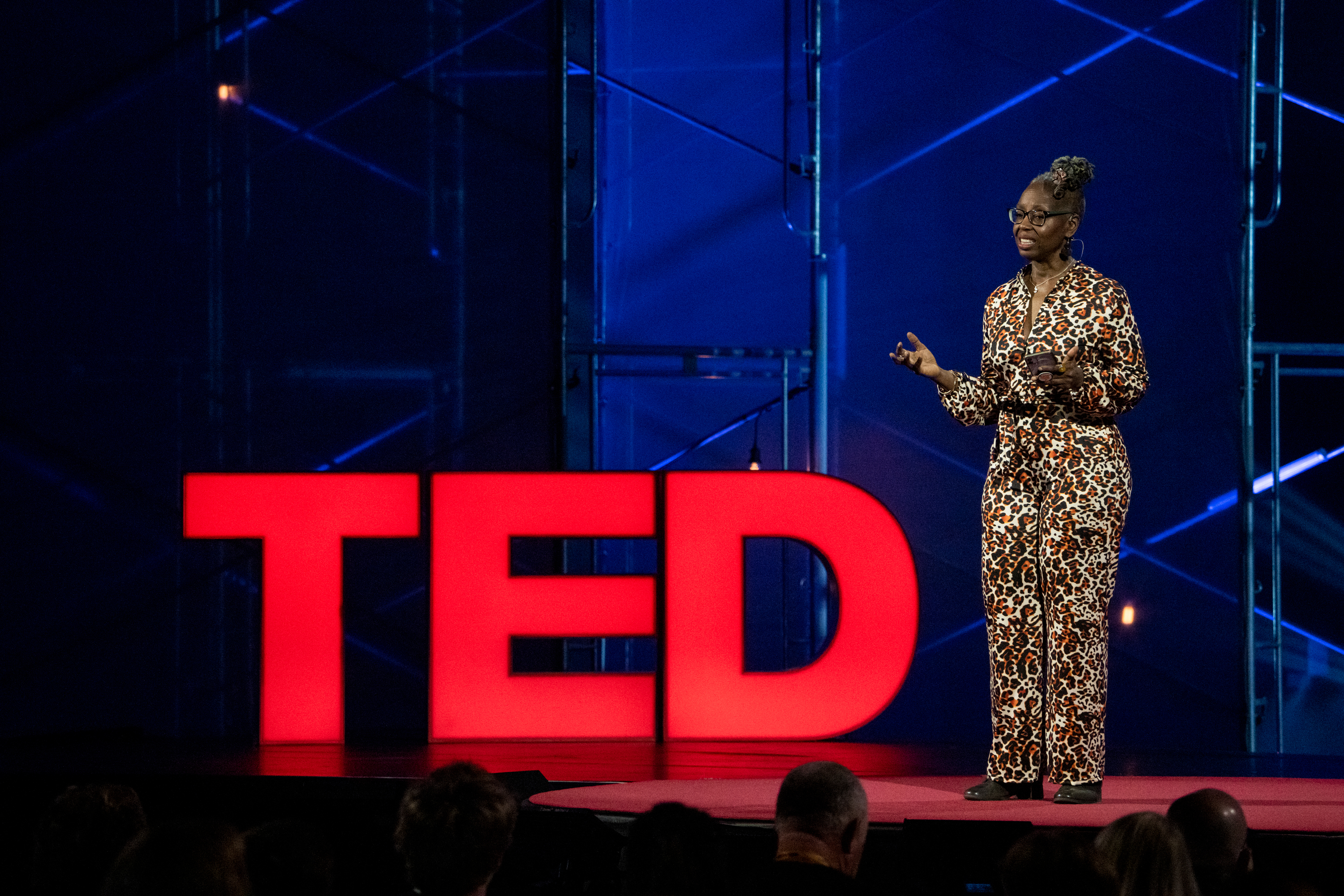
Kyra D. Gaunt speaks at Session 1 of TED Fellows Talks at TED2022: A New Era on April 10, 2022, in Vancouver, BC, Canada. (Photo: Ryan Lash / TED)
Kyra Gaunt, ethnomusicologist
Big idea: Musical play could be an empowering experience for young Black girls through which they can learn to love their own voices and disrupt the trends of anti-Black, patriarchal music.
How? As an ethnomusicologist, Kyra Gaunt studies the consequences of intimate bedroom musical play in Black girls, trying to understand how they could preserve the integrity of their own voices while technology and the media often misrepresent them. After years of viewing thousands of viral dance videos posted to the internet, she has made a few disturbing realizations, like the fact that many girls perform to songs that are produced, engineered and written by men, singing along to lyrics that often express anti-Black, patriarchal sentiments. Music and dance are therapeutic in many ways, particularly for Black girls whose musical play happens during their formative years, but many songs topping today’s charts are peppered with musical mansplaining that can have damaging implications for girls as they grow up to navigate situations like dating. Gaunt believes that Black girls could disrupt the stereotypes and stigmas created by algorithms on online platforms by learning to love their own voice. Whether this means producing their own dance songs or supporting female musicians, they could chart their own revolution in sound.
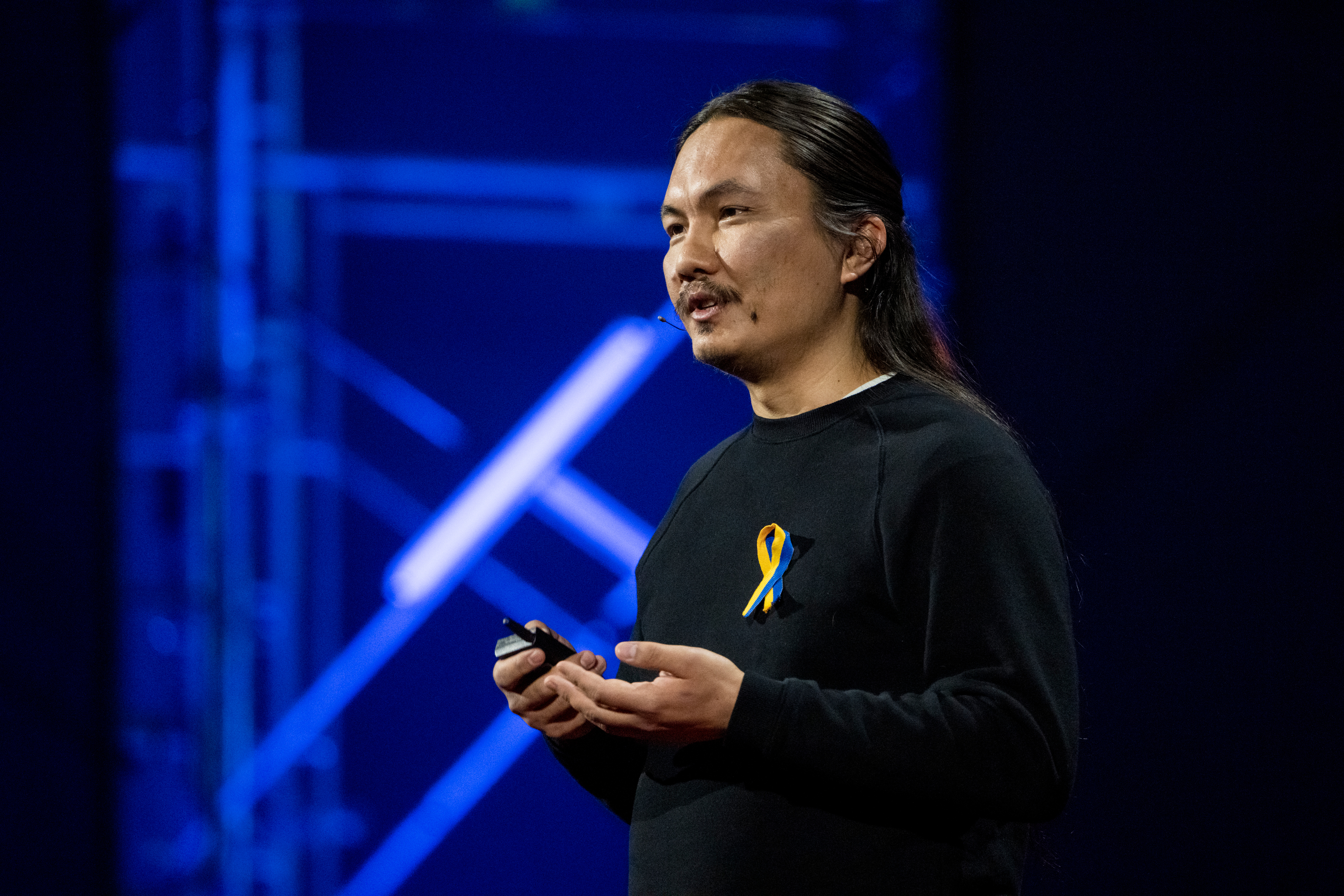
Bektour Iskender speaks at Session 1 of TED Fellows Talks at TED2022: A New Era on April 10, 2022, in Vancouver, BC, Canada. (Photo: Ryan Lash / TED)
Bektour Iskender, independent news publisher
Big idea: Journalism is a sword and shield against international crime and its leaders.
How? What makes criminal organizations strong? Their strong cross-border connections. They operate over long distances, build efficient logistics and hide their wealth across man jurisdictions. Iskender is one of the founders of Kloop, a self-described, very unusual media organization that reveals these secret operations. Initially a new website and journalism school, Kloop evolved as its students grew older and more ambitious alongside the stories they sought to cover — and became part of an expansive media network reporting on international organized crime. Their investigations put Central Asia on the map like never before. His organization’s work uncovered a corruption scandal that rocked his home country of Kyrgyzstan and sparked protests that eventually forced the president himself to resign, among several other revelations. The story Iskender shares only exemplifies the takeaways he’d like the world to understand. First, journalism networks are incredibly efficient, important and provide safety. Two, support local media organizations all around the world for their unique insights and connections. Recently, Kloop had started to branch out, making a second home in Ukraine. Highlighting his points, Iskender posits that a better linked and funded local journalism collaboration could have saved many lives preceding Russia’s war in Ukraine. Which leads to his third and final point: We must expand the cross-border networks outside of the media world, too. Because every exposed corrupt official, every organized crime leader is a chance to protect our world not only from smugglers and thieves, but also dictators and warmongers.
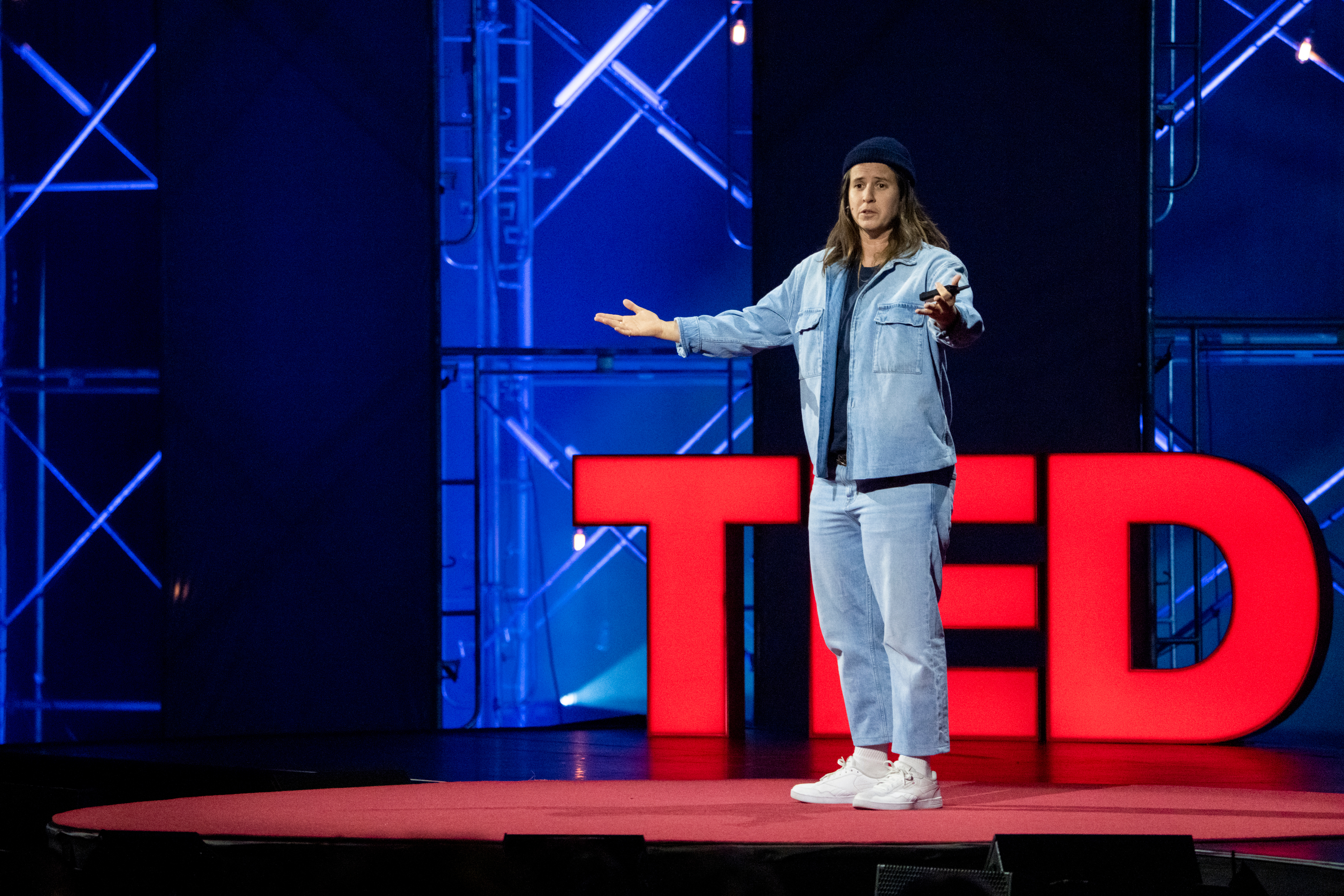
Constance Hockaday speaks at Session 1 of TED Fellows Talks at TED2022: A New Era on April 10, 2022, in Vancouver, BC, Canada. (Photo: Ryan Lash / TED)
Constance Hockaday, artist
Big idea: To achieve our hopes and goals individually and as a society, we need to fundamentally remodel our leadership styles to be more inclusive, collaborative and compassionate.
How? Though we live in a diverse and ever-changing world, our leadership models are archaic, narrow-visioned and stagnant. To illuminate new modes of leadership, Constance Hockaday invited artists from various backgrounds to design, write, create and perform public addresses as part of her Artists In Presidents project. She learned that leadership begins when one can express their autonomy, agency and desires: we need to be able to believe that our hopes and ambitions for a better world are possible. Belief does not form in a vacuum and it cannot be sustained alone—it’s crucial that we come together to share and build our interconnected dreams. Leadership, Hockaday says, is the ability to listen to these hopes and goals, however fragmented or vague, and guide people towards the truth of what they want and how they can achieve it. Leadership is a commitment to people; it is a way to help those around us understand how their individual dreams for the future are aligned with community-created, shared visions for a better world.